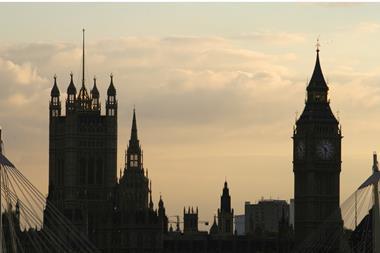UK-listed companies with defined benefit (DB) pension schemes issued 81 profit warnings in 2024. However, EY-Parthenon has suggested that companies could tap into their DB surplus for cash support.
This is the highest annual volume since the COVID-19 pandemic in 2020, when 249 profit warnings were issued, according to EY-Parthenon’s latest profit warning report.
In total, nearly one in four (24%) UK-listed companies with DB sponsors issued a profit warning last year.
In the final quarter of 2024, 28 profit warnings were issued by UK-listed companies with a DB pension scheme, a year-on-year increase of six warnings and the highest quarterly total since Q4 2020.
The highest volume of warnings was issued by companies in the FTSE Household Goods and Construction sector (15), followed by FTSE Industrial Support Services (12) and FTSE Retailers (7).
Rising costs (28%), contract issues and spending delays (26%), and credit tightening (11%) were cited as the main reasons for profit warnings.
Karina Brookes, UK pensions covenant advisory leader and EY-Parthenon partner, said the latest profit warnings data demonstrates the ongoing impact of external challenges such as global geopolitical uncertainty and policy upheaval on companies’ forecasting abilities.
She said: “In this environment, strategies for companies with a DB sponsor need to respond to both short-term policy changes and deeper structural issues, while being mindful of the changing pensions regulation, including the new DB Funding Code.”
Brookes pointed out that all valuations from September 2024 will now fall under the new code which, she said, emphasises the importance of covenant and the requirement to fund the scheme as soon as cash flows allow.
“For companies that are issuing a profit warning, there is a delicate balance between investing cash back into the business to improve longer-term prospects and, if it is needed, using the cash available to fund the scheme in accordance with the guidance.”
However, she suggested that companies with well-funded schemes that issue a profit warning could consider whether they are able to use scheme surpluses as a source of cash support, “provided there is the right support structure and agreement with the trustees in place to extract the surplus”.
The UK government is currently considering plans to lift restrictions on how well-funded DB schemes can access their surplus.
Paul Kitson, UK pensions consulting leader at EY, added that while average DB funding remained robust throughout 2024, the high number of profit warnings from listed UK firms with a DB pension scheme suggests that not all schemes are out of the woods yet.
Kitson pointed out that many trustees and companies are now digesting the government’s surplus return proposals “so balancing the funding level, covenant strength and potential use of surplus will be a delicate balance”.
He said: “As ever, it is critical for both trustees and companies to work together to understand their scheme, its employer covenant, and their best path forward – whether that be aiming to run-on with additional contributions, run on with surplus release, or buyout.”
Read the digital edition of IPE’s latest magazine























